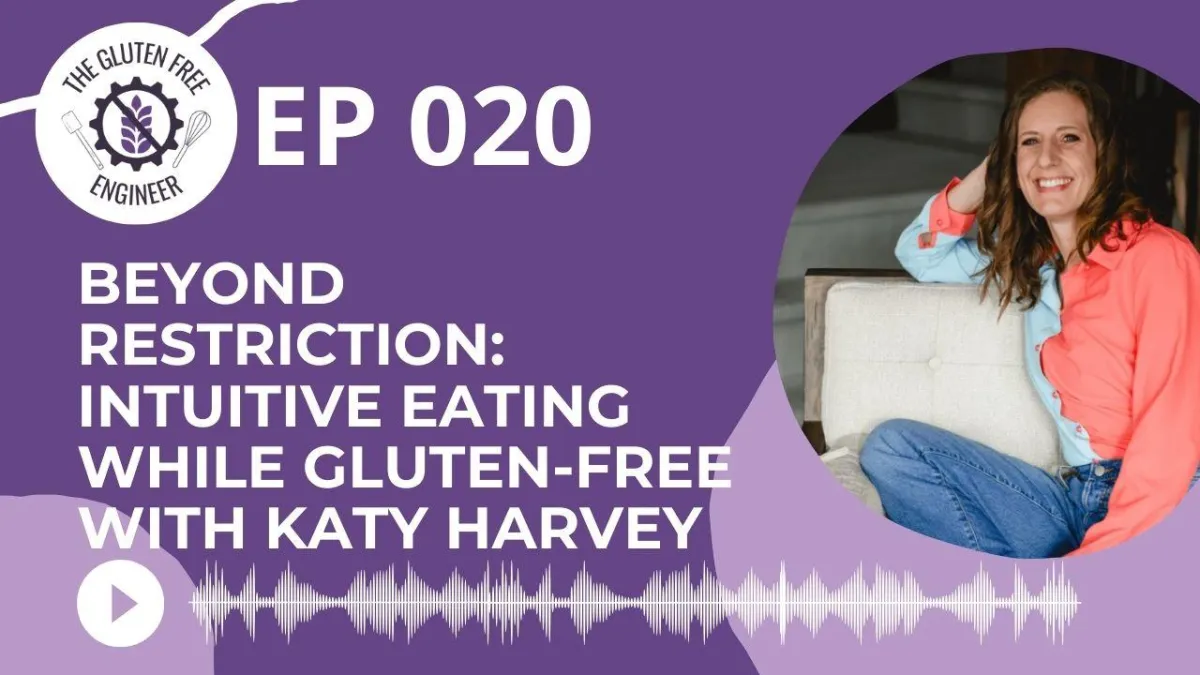
#20: Beyond Restriction: Intuitive Eating While Gluten-Free with Katy Harvey
Have you ever wondered if it's possible to practice intuitive eating when you medically can't eat certain foods? In this enlightening conversation with Katy Harvey, non-diet dietitian and intuitive eating specialist, we explore the complex relationship between necessary dietary restrictions and a healthy relationship with food.
Let's Recap: Intuitive Eating While Gluten-Free
Navigating the Gluten-Free Shift After a Celiac Diagnosis
When we're diagnosed with celiac disease or discover we need to be gluten-free, our relationship with food often undergoes a dramatic transformation. What was once simple – grabbing a sandwich, ordering pizza, enjoying a birthday cake – suddenly becomes complicated and sometimes even anxiety-inducing. But does eliminating gluten mean we have to adopt a diet mentality? According to Katy Harvey, registered dietitian and intuitive eating specialist, absolutely not.
Intuitive Eating Is Not “Eat Whatever You Want”
In our recent podcast conversation, Katy shared profound insights about the intersection of intuitive eating and necessary dietary restrictions. Many people assume that intuitive eating means "eat whatever you want whenever you want," but this is a fundamental misunderstanding. Intuitive eating is about honoring your body's needs – including medical needs like avoiding gluten when you have celiac disease.
Breaking Down Gluten-Free Myths
Katy explained that diet culture has permeated our society so deeply that we often conflate "gluten-free" with "healthier." This misconception leads many people to cut out gluten unnecessarily, believing they're making a virtuous choice. It's important to understand that gluten isn't inherently unhealthy for those who can tolerate it. For those who must avoid gluten for medical reasons, replacing gluten-containing foods with gluten-free versions doesn't automatically make your diet healthier – especially if you're swapping processed foods for other processed foods.
Medical Necessity vs. Diet Culture Restriction
One critical point Katy emphasized is the difference between medically necessary restrictions and diet-motivated restrictions. Avoiding gluten because you have celiac disease is honoring your body, while avoiding it to lose weight or because diet culture tells you it's "bad" is a form of restriction that can lead to disordered eating patterns. This distinction is crucial for a healthy relationship with food.
The Emotional Toll of Going Gluten-Free
The podcast also addressed the emotional aspects of transitioning to a gluten-free lifestyle. Katy validated the grief process many experience when diagnosed with celiac disease – the denial, anger, bargaining, depression, and eventually acceptance. This grief is entirely valid; being gluten-free affects nearly every aspect of social eating, from restaurant choices to birthday parties to family gatherings. The mental load of constantly checking for cross-contamination and planning ahead for safe food options is substantial.
Rethinking Weight and Health on a Gluten-Free Journey
Perhaps most valuable was Katy's insight about weight concerns while being gluten-free. Diet culture tells us we should always be striving to be thinner, but Katy debunked this myth, explaining that dieting is actually the number one predictor of weight gain, not weight loss. About 95% of people who diet regain the weight within 2–5 years, and about two-thirds gain back more than they lost. This cycle of weight loss and regain (called weight cycling) is actually more harmful to our health than maintaining a stable weight – even if that weight is higher than diet culture's ideal.
The Truth About Belly Fat and Menopause
For women approaching menopause, Katy shared a particularly liberating perspective on belly fat: it serves a biological purpose. As estrogen production decreases, the body compensates by storing more belly fat, which secretes estrogen to protect heart and bone health. Instead of fighting this natural and protective process, we can practice acceptance and appreciation for our body's wisdom.
A Path Forward: Nourishment Without Restriction
The conversation offered a path forward for anyone navigating celiac disease or gluten intolerance – one where we can honor our health needs without falling into diet traps, where we can find joy in food despite restrictions, and where we can cultivate compassion for our bodies instead of constantly fighting against them. This approach offers not just physical health, but mental and emotional wellbeing too.
Resources to Support Your Journey
For those interested in learning more about intuitive eating while managing necessary dietary restrictions, Katy recommended joining her Facebook group "Intuitive Eating Made Easy" or exploring her courses "Stepping Off the Dieting Rollercoaster" and "Non-Diet Academy." These resources provide structured support for rebuilding a healthy relationship with food, even when medical conditions require certain limitations.
